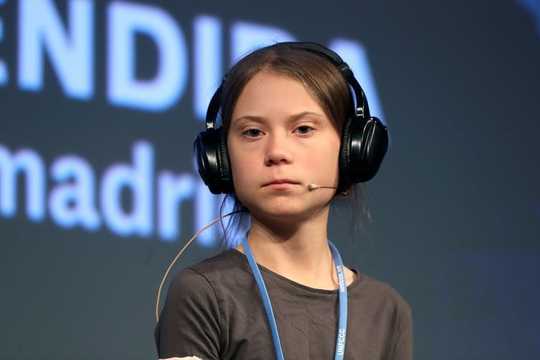 Family discussion about politics can be fraught - especially climate politics. Flickr
Family discussion about politics can be fraught - especially climate politics. Flickr
As bushfires rage and our cities lie shrouded in smoke, climate change is shaping as a likely topic of conversation at the family dinner table this Christmas.
Such discussions can be fraught if family members hold differing views. You may not all agree on the urgency of dealing with climate change – or indeed whether it is happening at all.
When I teach the art of argumentation – a core skill of critical thinking – I tell my students about the concept of “point at issue”. This is what the argument is about and should be the focus of rational discussion.
But when debating emotive and controversial topics such as climate change, the point at issue can become lost.
So what to do? We can learn much from Swedish climate activist Greta Thunberg – a master of staying on topic.
A simple, unwavering message
Thunberg is in the Spanish capital Madrid this week for COP25 – a major conference of nations signed up to the Paris climate agreement.
Thunberg’s solo school strikes in Sweden last year sparked a global movement. But in typical rational style, Thunberg told supporters in Madrid the protests have “achieved nothing” because global emissions are still rising.
Thunberg’s public statements consistently communicate a few key points:
- the planet is warming, we are responsible and we need to fix it
- hope is fine, but it is pointless without action
- economic concerns are irrelevant in the face of collapsing ecosystems
- if we do not fix this, future generations will remember us for our failures.
 A smoke haze covering the coast is bringing climate concerns to the fore. Stephen Saphore/AAP
A smoke haze covering the coast is bringing climate concerns to the fore. Stephen Saphore/AAP
Each time Thunberg speaks, these issues are centre-stage. She is not distracted by rhetoric, straw-man arguments, personal abuse, or by condescension or appeals to economic theory.
For example in a TED talk in March, Thunberg responds with uncommon clarity to those who seek to put the burden of action back on her:
Some people say that I should study to become a climate scientist so that I can “solve the climate crisis.” But the climate crisis has already been solved. We already have all the facts and solutions.
Note how the burden is placed back where it belongs: on those who have the power to act now.
Thunberg also refuses to be distracted by patronising comments. When meeting with the US Senate’s climate crisis taskforce in September, she was commended for her enthusiasm and replied:
Please save your praise. We don’t want it […] Don’t invite us here to just tell us how inspiring we are without actually doing anything about it because it doesn’t lead to anything.
To claims she should be in school rather than protesting, Thunberg says:
Why should any young person be made to study for a future when no one is doing enough to save that future? What is the point of learning facts when the most important facts given by the finest scientists are ignored by our politicians?
Thunberg says she has Asperger’s syndrome, an autism spectrum disorder (ASD). She describes it as a “superpower” which has “definitely helped me keep this focus”.
Research has found that people with ASD have a heightened ability to focus on some tasks and in particular, to identify “critical” information.
 Greta Thunberg has autism spectrum disorder, and describes it as her ‘superpower’ AAP
Greta Thunberg has autism spectrum disorder, and describes it as her ‘superpower’ AAP
Back to the dinner table
We may not have Thunberg’s natural aptitude for staying on topic. But we can apply the lessons to our own conversations with friends and family.
Let’s say I’m having an argument with a cranky uncle about renewable electricity. I might argue that we should transition to wind and solar energy because it generates less carbon dioxide than burning fossil fuels.
My uncle might respond by saying I shouldn’t use any energy at all. Maybe he’ll say “then stop driving cars” or “don’t turn on your TV”.
But this response is not addressing the point at issue – that renewable energy generates less carbon than fossil fuels. It is talking about something else: that any use of power is bad. Really, it’s not so much about using power as how that power is generated.
Moving off the point at issue is a classic “strawman” attack, when the argument is misrepresented and argued from that point.
Keeping the argument on track, and keeping it both civil and productive, is a key skill in critical thinking. It is helped by:
- making sure everyone is clear about what the point at issue actually is
- bringing the conversation back to the point when it strays, or at least acknowledging that we are now talking about something else
- calling out any misrepresentation of the point.
This will help keep the integrity of the argument intact and avoid it degenerating into an exchange of ideological blows.
If you need extra help, my colleagues and I have produced a paper to help analyse the rationality of climate denial claims. It also helps you find the point at issue, and stay on it.
This is a skill worth developing in discussion with friends and family. In the maelstrom of ideology surrounding climate change in this post-truth world, keeping a rational focus is critical.![]()
About the Author
Peter Ellerton, Lecturer in Critical Thinking; Curriculum Director, UQ Critical Thinking Project, The University of Queensland
This article is republished from The Conversation under a Creative Commons license. Read the original article.
Related Books
Drawdown: The Most Comprehensive Plan Ever Proposed to Reverse Global Warming
by Paul Hawken and Tom Steyer In the face of widespread fear and apathy, an international coalition of researchers, professionals, and scientists have come together to offer a set of realistic and bold solutions to climate change. One hundred techniques and practices are described here—some are well known; some you may have never heard of. They range from clean energy to educating girls in lower-income countries to land use practices that pull carbon out of the air. The solutions exist, are economically viable, and communities throughout the world are currently enacting them with skill and determination. Available On Amazon
In the face of widespread fear and apathy, an international coalition of researchers, professionals, and scientists have come together to offer a set of realistic and bold solutions to climate change. One hundred techniques and practices are described here—some are well known; some you may have never heard of. They range from clean energy to educating girls in lower-income countries to land use practices that pull carbon out of the air. The solutions exist, are economically viable, and communities throughout the world are currently enacting them with skill and determination. Available On Amazon
Designing Climate Solutions: A Policy Guide for Low-Carbon Energy
by Hal Harvey, Robbie Orvis, Jeffrey Rissman With the effects of climate change already upon us, the need to cut global greenhouse gas emissions is nothing less than urgent. It’s a daunting challenge, but the technologies and strategies to meet it exist today. A small set of energy policies, designed and implemented well, can put us on the path to a low carbon future. Energy systems are large and complex, so energy policy must be focused and cost-effective. One-size-fits-all approaches simply won’t get the job done. Policymakers need a clear, comprehensive resource that outlines the energy policies that will have the biggest impact on our climate future, and describes how to design these policies well. Available On Amazon
With the effects of climate change already upon us, the need to cut global greenhouse gas emissions is nothing less than urgent. It’s a daunting challenge, but the technologies and strategies to meet it exist today. A small set of energy policies, designed and implemented well, can put us on the path to a low carbon future. Energy systems are large and complex, so energy policy must be focused and cost-effective. One-size-fits-all approaches simply won’t get the job done. Policymakers need a clear, comprehensive resource that outlines the energy policies that will have the biggest impact on our climate future, and describes how to design these policies well. Available On Amazon
This Changes Everything: Capitalism vs. The Climate
by Naomi Klein In This Changes Everything Naomi Klein argues that climate change isn’t just another issue to be neatly filed between taxes and health care. It’s an alarm that calls us to fix an economic system that is already failing us in many ways. Klein meticulously builds the case for how massively reducing our greenhouse emissions is our best chance to simultaneously reduce gaping inequalities, re-imagine our broken democracies, and rebuild our gutted local economies. She exposes the ideological desperation of the climate-change deniers, the messianic delusions of the would-be geoengineers, and the tragic defeatism of too many mainstream green initiatives. And she demonstrates precisely why the market has not—and cannot—fix the climate crisis but will instead make things worse, with ever more extreme and ecologically damaging extraction methods, accompanied by rampant disaster capitalism. Available On Amazon
In This Changes Everything Naomi Klein argues that climate change isn’t just another issue to be neatly filed between taxes and health care. It’s an alarm that calls us to fix an economic system that is already failing us in many ways. Klein meticulously builds the case for how massively reducing our greenhouse emissions is our best chance to simultaneously reduce gaping inequalities, re-imagine our broken democracies, and rebuild our gutted local economies. She exposes the ideological desperation of the climate-change deniers, the messianic delusions of the would-be geoengineers, and the tragic defeatism of too many mainstream green initiatives. And she demonstrates precisely why the market has not—and cannot—fix the climate crisis but will instead make things worse, with ever more extreme and ecologically damaging extraction methods, accompanied by rampant disaster capitalism. Available On Amazon
From The Publisher:
Purchases on Amazon go to defray the cost of bringing you InnerSelf.comelf.com, MightyNatural.com, and ClimateImpactNews.com at no cost and without advertisers that track your browsing habits. Even if you click on a link but don't buy these selected products, anything else you buy in that same visit on Amazon pays us a small commission. There is no additional cost to you, so please contribute to the effort. You can also use this link to use to Amazon at any time so you can help support our efforts.



























